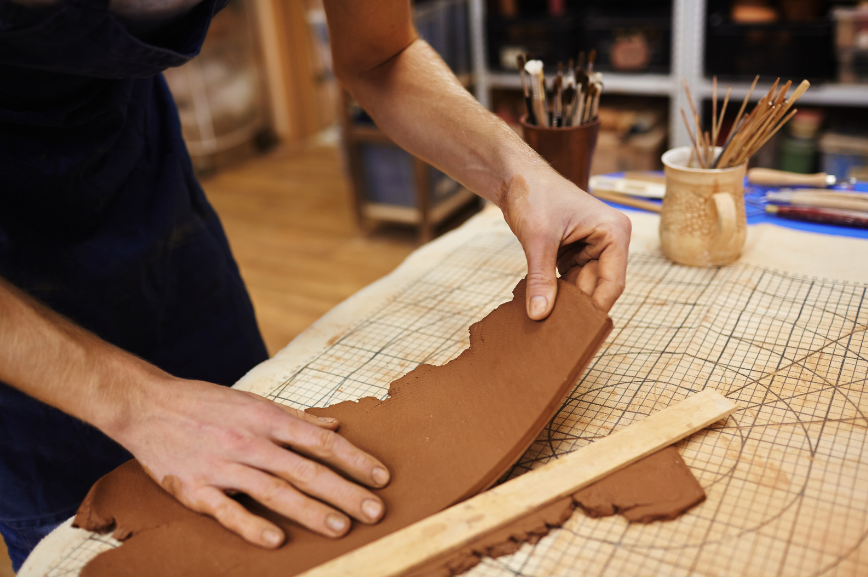In this blog post, let’s consider the key steps on how you can transform your passion into a thriving, successful handmade business.
Do you have a creative hobby that brings you joy and fulfillment? Perhaps you’re an artist, a crafter, a baker, or a jewelry maker who’s passionate about your craft. If so, you may have considered turning your passion into a handmade business.
The idea of doing what you love and making a living from it is a dream many aspire to achieve. And indeed, many have made their handmade business dreams come true.

Discover Your Passion
The first step in turning your passion into a successful handmade business is to get to know what you’re truly passionate about. Consider the activities that make you lose track of time and bring you the most satisfaction.
For many successful small business entrepreneurs, they discover a newfound passion in a hobby they pick up later in life or a craft they’ve recently learned. Eventually, they are able to start a business based on their newfound craft.
Whether it’s painting, knitting, woodworking, or any other craft. Your business will be most successful if it’s built around something you love to do.

Research Your Market
Before diving into the world of handmade business, you need to spend some time researching your market thoroughly. Identify your target audience and understand their preferences and needs.
Who would be interested in your handmade products? How can you reach your prospects effectively? Analyzing your competition can also provide valuable insights into what sets your products apart.
Create a Business Plan
A well-structured business plan is essential for success. Define your business goals, set a budget, and outline your business model. Consider how you’ll source materials, produce your products, and set prices. A business plan will provide a roadmap for your handmade business’s growth.
Legal and Financial Considerations
Starting a handmade business comes with legal and financial responsibilities. The legalities often include registration of your business, choosing a suitable legal structure, and obtaining any necessary licenses or permits.
From the very beginning, it’s important to keep meticulous records of your income and expenses for tax purposes. Additionally, consider opening a separate business bank account. Doing so will make financial management easier for you. It is also an great way to enhance your business’s credibility, enjoy tax benefits, and simplify your process of complying to legal requirements.
Product Development & Production
With a clear plan in place, get ready for product development and production. As a handmade business, you may start with producing in small batches. Having a production schedule is crucial to ensure you will have a steady supply of items.
Needless to say, quality control is crucial. Remember that consistency in the quality of your handmade products will be your key to building a loyal customer base.
Pricing Strategy
Pricing your handmade products can be a challenging task. Consider the cost of materials, your time and labor, and don’t forget to factor in a reasonable profit margin. Be competitive in your pricing while maintaining the perceived value of your products.

Sales Channels
Diversify your sales channels to reach a wider audience. In addition to social media and your own website or online store, consider selling on popular handmade marketplaces like Etsy or at your local craft fairs and markets.
Engage with potential customers, offer exceptional customer service, and always ask for reviews and referrals. Good word of mouth will make a significant impact in establishing your presence in the market and a solid brand image.
Branding and Marketing
Develop a strong brand identity for your handmade business. Choose a business name, create a logo, and design product packaging that represents your style.
Establish an online presence through social media platforms and a website. Share your passion and story with potential customers to create a personal connection.
Creating a business website can be done in a later stage as you initially focus on introducing your business to your market through social media marketing.
Develop Your Craft
While your passion might be the foundation of your business, it’s crucial to continually improve your skills. Invest in honing your craft by taking classes, attending workshops, and experimenting with new techniques. The better your products, the more competitive you’ll be in the market.

Adapt and Grow
As your handmade business evolves, be prepared to adapt to changes in the market and your customers’ preferences. Stay open to feedback and continually seek opportunities for growth and expansion.
You Can Have A Successful Handmade Business!
Turning your passion into a successful handmade business is an exciting journey, filled with opportunities to showcase your creativity and earn a living doing what you love. Starting a handmade business often begins with a hobby or skill you’re passionate about, and with the right steps, it can evolve into a sustainable and profitable venture. The process involves careful planning, consistent effort, and a deep understanding of your target audience.
Achieving a successful handmade business requires not just talent but also perseverance. Building a strong brand, engaging with your customers, and continuously refining your products are essential strategies for standing out in a competitive market. While the road to success may have its challenges, staying focused and motivated will help you overcome them.
Remember, success doesn’t happen overnight. Patience, dedication, and resilience are the keys to growing a successful handmade business. What matters most is your commitment to your craft and the ability to adapt to changing trends and customer needs. With time and effort, your handmade business can flourish, offering not only financial rewards but also personal fulfillment and pride in your creations.
Whether you’re just starting or looking to expand, the journey of creating a successful handmade business is as rewarding as the results. Stay true to your vision, and let your passion guide you toward building a thriving enterprise.
4o